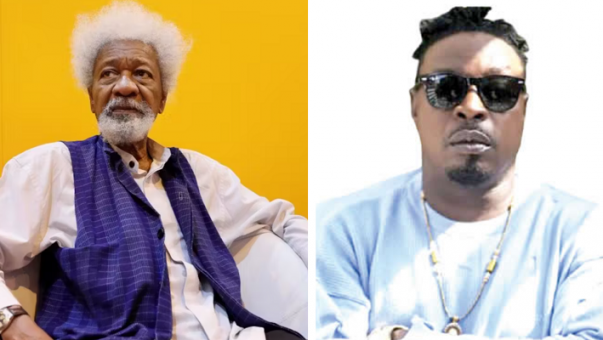Nobel Laureate Prof Wole Soyinka on Monday chided the National Broadcasting Commission (NBC) for barring broadcast stations from playing Eedris Abdulkareem’s latest song, “Tell Your Papa”
In the song is a message to Seyi Tinubu, son of President Bola Tinubu, urging him to tell his father that Nigerians are suffering because of his economic policies.
The album was released in the wake of the implementation of bold economic reforms, hailed by some global organisations, but decried by critics due to the effects of inflation and drop in value of the naira.
The Federal Government has asked for patience on the part of citizens, assuring that the pains are temporary
In a statement titled: ‘Surely, Not Again’ sued from New York University, Abu Dhabi, Soyinka said the ban signaled a return to the culture of censorship and a threat to the right to free expression.
He said: “Courtesy of an artist operating in a different genre – the cartoon – who sent me his recent graphic comment on the event, I learnt recently of a return to the culture of censorship with the banning of the product of a music artist, Eedris Abdulkareem.”
Soyinka said the ban did not go far enough, adding: “It is not only the allegedly offensive record that should be banned – the musician himself should be proscribed. Next, PMAN, or whatever musical association of which Abdulkareem is member, should also go under the hammer.”
Soyinka who admitted that he has not listened to the banned song, said the issue transcended the content and concerned a fundamental democratic principle.
He added: “It cannot be flouted. That, surely is basic. This is why I feel that we should look on the bright side of any picture and thus recommend the Aleshinloye cartoon – and others in allied vein – as an easy-to-apprehend, easy-to-digest summation of the wisdom of attempting to stifle unpalatable works of art or socio-political commentary.”
Soyinka observed that censorship often benefits the targeted artist, saying that it could be inadvertently promotional.
He said: “The ban is a boost to the artist’s nest egg, thanks to free governmental promotion. Mr. Abdulkareem must be currently warbling his merry way all the way to the bank. I envy him.”
The Nobel Laureate described the censorship as not only counterproductive, but also dangerous to democratic development.
He added: “We have been through this before, over and over again, ad nauseum. We know where it all ends. It is boring, time-wasting, diversionary but most essential of all, subversive of all seizures of the fundamental right of free expression.”
Soyinka warned that censorship could create “a permissive atmosphere of trickle-down power,” where state authorities feel emboldened to clamp down on dissent.
Also reflecting on recent lynching of travelers in Uromi, Edo State, he commiserated with the families and colleagues of the victims.
He said: “My heart goes out to friends, colleagues and families of victims and traumatised survivors of this senseless slaughter. Our thirst for justice must remain unslaked.”
Recalling the killing of Deborah Samuel in Sokoto in 2022, he condemned the culture of impunity.
Soyinka said: “Identified killers were set free to gloat, and paste their photos on the Social Media… in full daylight glare, in the presence of both citizen voyeurs and security forces.”
